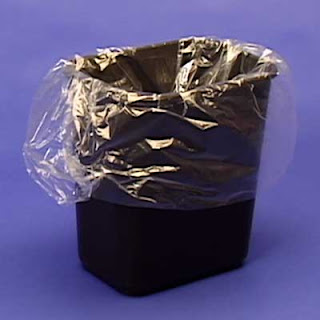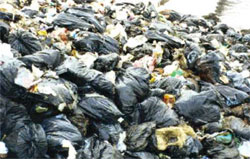I am just finishing up a project for SCU’s library where with a team of three other people we proved that removing individual trash cans from every study room in our library (a total of about 40 rooms) reduced the total amount of waste created as well as left the rooms just as clean. I know you are thinking right now, “who cares?” but this is actually a big deal.
Have you ever considered how much of your trash is made up of the bag alone? On campus the custodians have to empty the trash cans daily, even if there is just a single item in the bag. This meant that we were having nearly empty bags being removed from every single one of the rooms every day.
So what? Trash bags are meant to be thrown out, what difference does it make? It makes a huge difference. Even though companies sell us these bags to contain our garbage perfectly until we get them to the curb, they give little consideration to what happens after they leave your curbside can. Did you know that most trash bags are made of plastic, a material that can take millions of years to break down?
Even then plastic is not an organic material that can be ingested and broken down by microorganisms or other living things. Instead they are broken down by the sun and other physical forces that really only break them up into smaller and smaller particles. In other words, your plastic trash bag will outlive you by millions of years and the particles of every bag you have ever thrown out will never disappear.
Starting to feel bad about every single plastic bag you have ever sent to the dump? Don’t worry, there are better options that will break down naturally and quickly.
Look for compostable or biodegradable bags at your grocery store, specialty food stores, local hardware store, or online. The options are abundant and the prices, though not exactly as cheap as their polluting counter-parts, are still low and affordable on any budget.
Also, don’t forget to compost all food items so you can take out the trash less often, save yourself money, and send fewer bags to the landfill. Can’t compost where you live and there are no facilities near you that will take compostable items? You can still collect food scraps in a container under the sink and take those out separately every day to decrease bags used and the stench when you don’t take out the trash enough.















